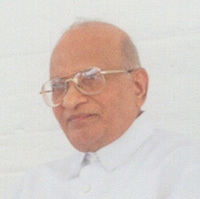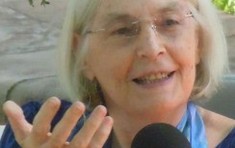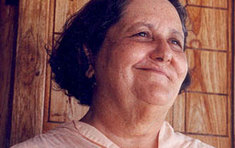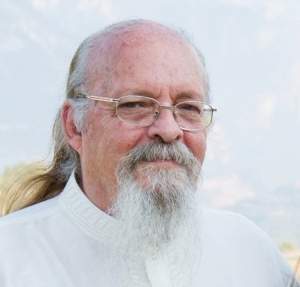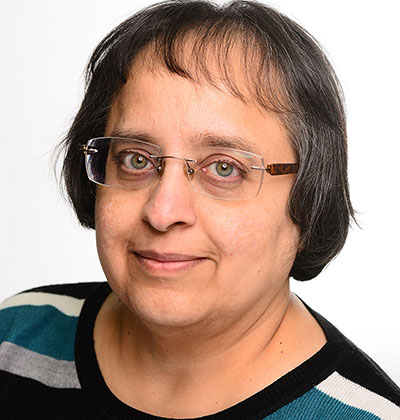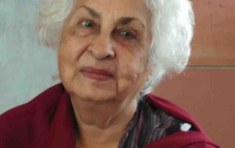Last updated:
Satprem
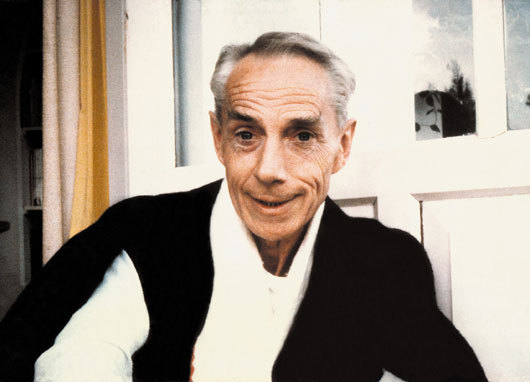
Satprem (born Bernard Enginger) passed away on April 9th, 2007 at the age of 84. Through his books, and particularly through his role in the publication of the 13 volumes of Mother's Agenda, Satprem played a key role not only in introducing many people to the works of Sri Aurobindo and The Mother, but also in explaining the scope and significance of the great endeavour They had undertaken. His writings have inspired, and will continue to inspire, people worldwide with their incandescent call to take up the great work of physical transformation begun by Sri Aurobindo and The Mother, a work which he and his spiritual collaborator, Sujata, attempted to continue after Mother's passing.
He was also a figure of considerable influence in Auroville during the early years and during the conflict with the Sri Aurobindo Society, a struggle which he saw as crucial for Auroville's integrity and for the furtherance of Mother's work. Satprem was a charismatic figure who, in his uncompromising stances, attracted great loyalty from some and criticism from others. A survivor of the concentration camps, he stood against all forms of tyranny. Yet some blamed him for his fierce criticism of the Sri Aurobindo Ashram and for his attacks upon those who did not follow the path which he favoured.
The following is a slightly edited version of a brief biography of Satprem in Georges van Vrekhem's book, "Beyond Man".
Satprem (…) is a Frenchman who was born in Paris in 1923, but who always nostalgically remembered his youth on the coast of Brittany . In the Second World War he became a member of the Resistance. He had just turned twenty when the Gestapo arrested him; he spent one and a half years in German concentration camps. After the war, and deeply branded by those experiences, he became an exponent of the problematics and the life-view of Existentialism, although not Sartre and Camus but Gide and Malraux were the main sources of his inspiration.
In 1946, he wrote in a letter to André Gide: “I loved you, and certain passages from your books have helped me to survive in the concentration camps. From you I got the force to break away from a bourgeois and material comfort. Together with you, I have been seeking “not so much for possession as for love.” I have made a clean sweep to stand completely new before the new law. I have made myself free ... Finally, I have broken away from you, but I have found no new masters and life keeps suffocating me. The terrible absurdity of the likes of Sartre and Camus has solved nothing and only opens the gates to suicide.'
Satprem worked briefly as a functionary in the colonial administration of Pondicherry , but he felt dissatisfied and unfulfilled everywhere and went in search of adventure in French Guyana, Brazil and Africa .
However, when in Pondicherry he had had the darshan of Sri Aurobindo and The Mother, and he carried The Life Divine with him even in the rain forests of the Amazon. In 1953, after those wanderings, he returned to Pondicherry to meet The Mother and settle in the Ashram against his individualistic and rebellions nature. “[I was] a good rebellious Westerner and all ways of changing the world looked a priori excellent,” he writes. He was at times teaching in the Ashram school, and with his remarkable literary talent he looked after the French copy for the Bulletin of the Department of Physical Education which, in fact, was The Mother's publication. This periodical was (and still is) a quarterly and has all texts printed in English and in French.
Satprem's first years in the Ashram were a period of dissatisfaction, restlessness, doubts, and sometimes loudly voiced revolt. He has included part of his correspondence with The Mother in the first volume of the Agenda; these letters present us with a moving picture of the patience, understanding and love with which The Mother treated her rebellious children. She has never accepted somebody for the Yoga without a reason, and when she accepted somebody, it was unconditionally and for ever. Time and again Satprem imagined he had to find his inner fulfilment in adventure. There is not an exotic place on Earth he did not feel impelled to go to; the Congo , Brazil (again), Afghanistan , the Himalayas, New Zealand , the Gobi desert, a journey around the globe in a sailing boat, all that and more is dreamt of in his letters. But The Mother knew what was really prompting him and she let him become, in 1959, the disciple of a very able tantric yogi who was also the head priest of the big temple in Rameshwaram. Then, guided by another yogi, Satprem wandered during six months as a sanyasi (mendicant monk) through India and received the initiation of the sanyasis. His novel Par le corps de la terre, ou le Sanyassin (By the Body of the Earth, or The Sanyasi) is based on these experiences.
But “the bird always returned to the nest”, to the Ashram in Pondicherry , to The Mother. She started inviting him from time to time to her room, at first apparently for some literary chores in connection with the Bulletin. He became more and more spellbound by her. He asked questions (or she instilled the questions into him) and she answered. “At first, she had me called, and there was that big chair in which she was sitting, and I sat down on the carpet on the floor and listened to her. Truly, she knew so much. It was wonderful to listen to her. But most important, little by little she began telling her experience.”
However violently Satprem might express himself emotionally, he was a cultured man and possessed a very keen intellect, widely varied interests, and as a writer a passionate, colourful style. We have already seen that The Mother complained about the lack of intellectual eagerness and cultural as well as general interest in the people around her. She had so much to communicate, to share, her knowledge and experience were so broad in all essential domains where the human being is confronted with “the great questions”, but so little was asked of her. “I am a little bell that is not sounded”, she said. Here now was a man with an analytical mind, a poignant life-experience and a thirst for knowledge – the ideal instrument to communicate to others a glimpse of her unbelievable adventure. At the same time she worked on him, in him; she did his yoga as she did the yoga of all those she had accepted and taken into herself.
Satprem started realizing the importance of those conversations with The Mother and took a tape-recorder to her room. Thus the Mother's Agenda came about. One part of it concerned the literary work he was doing for The Mother; another part concerned his own yogic evolution, his yogic education; and the third part of the conversations was intended by The Mother as the registration, in broad outlines, of the process of her transformation. Everything The Mother said was interesting, everything was informative and instructive, though she herself most probably would never have allowed some confidential passages about persons in her entourage to be published.
After the passing of The Mother, a gap has come about between the Ashram and Satprem, with regrettable consequences. Under The Mother's direction he had written Sri Aurobindo, ou l'Aventure de la conscience (Sri Aurobindo, or the Adventure of Consciousness), a book that has led so many to Sri Aurobindo and The Mother.
He had also read out to her La Genèse du surhomme (The Genesis of Superman), an essay highly lauded by her. Then after her departure, he wrote the trilogy Mère (Mother), in which for the first time he analyses and comments upon the invaluable material of the Agenda of which he was the only possessor at that time. Le mental des cellules (The Mind of the Cells) is a kind of crystallization of the trilogy, and in Gringo and recently in Evolution II [and Notebooks of an Apocalypse] he reports about his own evolution (….) In a letter from 1983 one reads: “I had to take the decision to withdraw because I was no longer progressing in my [inner] work, I kept turning around in a circle. There must be at least one human being to prove, to show to the world that the way of the new species is practicable for humans. Otherwise, what is the use of what Mother and Sri Aurobindo have done for humankind?”
Georges
The Great Sense
This is the time of the Great Sense.
We look to the right or to the left, we build theories, reform our Churches, invent super-machines and we go out in the streets to break the Machine that stifles us – we struggle in the small sense. When the terrestrial ship is sinking, does it matter whether the passengers drown to the right or left, under a flag black or red, or one of celestial blue? Our Churches have already sunk: they are reforming their own dust. Our patriotisms are crushing us, our machines are crushing us, our schools are crushing us, and we build more machines to break out of the Machine. We go to the moon, but we do not know our own heart or our terrestrial destiny. And we want to improve what is – but the time for improvements is past: can one improve rot? – This is the time for SOMETHING ELSE, which is not the same thing with improvements.
But how shall we proceed?
They preach violence to us, or non-violence. But these are two faces of the same Falsehood, the yes and the no of the same impotence: the little saints have gone bankrupt with the rest, and others want to seize power – what power? That of the statesmen? Are we going to fight over the prison keys? Or to build another prison? Or do we really want to get out of it? Power does not spring from the barrel of a gun, neither does freedom flow from the belly of the dead – for thirty million years now we have been building on corpses, on wars, on revolutions. And the drama is enacted over and over again. Perhaps the time has come to build on something else and find the key to true Power?
So let us look at the great Sense.
Here is what the Great Sense tells us:
It tells us that we were born so many million years ago – a molecule, a gene, a bit of quivering bit of plasma – and we have produced a dinosaur, a crab, an ape. Had our eyes stopped half-way along the road, we could have said with good reason (!), that the Baboon was the summit of the creation, and nothing better could be done, except perhaps to improve our simian capacities and create a United Kingdom of Apes… And we may be committing the same error today in our jungle of concrete. We have invented enormous means at the service of microscopic consciousnesses, splendid devices at the service of mediocrity, and still more devices to be cured of the Device. But is man truly the goal of all these millions of years of striving? – The secondary school for all and the washing machine?
The Great Sense, the True Sense, tells us that man is not the end. It is not the triumph of man that we want, not an improved version of the intelligent dwarf – it is another man on the earth, another race in our midst.
‘Man is a transitional being' Sri Aurobindo said. We are right in the middle of this transition, it is bursting forth on every side: in Biafra, in Israel , in China , on the Boul'Mich. Man is uncomfortable in his skin.
And the Great Sense, the True Sense, tells us that the only thing we can do is to set to work to prepare that other being and collaborate in our own evolution instead of going round in circles in the old dead-end humanhood and grabbing false powers to rule over a false life.
But where is the lever of this Transmutation?
It is within.
There is a Consciousness within, there is a Power within, the very power that strained and strove in the dinosaur, in the crab, in the ape, in man – it strives still, presses farther on, clothes itself in a more and more perfected form as its instrument grows, and creates its own form. If we grasp the lever of that Power, it will create its own form, for it is itself the lever of the Transmutation. Instead of letting evolution unfold through millennia of fruitless, painful attempts and useless deaths and fake revolutions that revolutionize nothing, we can shorten the time, we can make a concentrated evolution – we can be the conscious creators of the New Being.
In truth, it is the time of the Great Adventure. The world is closed, there are no more adventures to be had outside: only robots go to the moon and our frontiers are guarded everywhere – in Rome or in Rangoon , the same functionaries of the great Machine are watching us, punching our cards, checking our faces and searching our pockets – there is no more adventure outside! The Adventure is within – Freedom is within, Space is within, and the transformation of our world by the power of the Spirit. Because, in truth, that Power was always there, supreme, all-powerful, prodding evolution on: it was the hidden Spirit growing to become the Spirit manifest upon earth, and if we have trust, if we want that supreme Power, if we have the courage to descend into our hearts, everything is possible, because God is in us.
Courtesy of "Auroville Today" magazine
